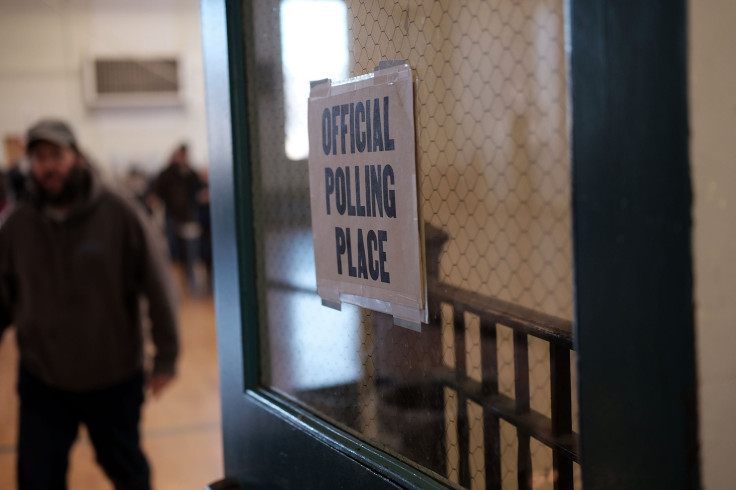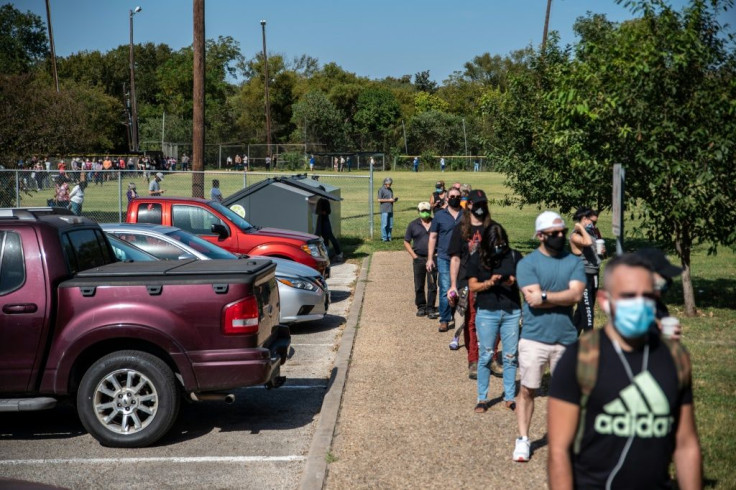Texas Voter Went Viral After Standing In Line For 6 Hours, Turns Out He Was Voting Illegally

KEY POINTS
- Hervis Rogers is faced with two charges related to illegal voting
- Rogers became a social media star in March 2020
- Rogers’ case is similar to Crystal Mason, who was sentenced to five years for illegal voting
- Texas Republicans have advanced two new restrictions on state voting laws
A 62-year-old man from Texas who went viral last year during the Democratic primary elections, is now facing charges related to illegal voting.
Hervis Rogers’ dogged determination to exercise his right to vote in 2020 made him a social media sensation and "national hero" after his story was shared online. At that time, Rogers told ABC affiliate KTRK that he "wasn't going to let anything stop me, so I waited it out."
He stood in line for six hours to cast his vote.
Breaking: Hervis Rogers, who stayed in line for 6 hrs to vote last year, is being prosecuted by AG Ken Paxton's office for allegedly voting illegally, his attorney confirms.
— Jen Rice (@jen_rice_) July 9, 2021
Rogers was a registered voter. He was on parole & he told me he believed he was eligible. Story to come. https://t.co/cYoldXXHVY
Court records from Harris County showed that Hervis Rogers was ineligible to vote in March last year as he was still on parole during that time, Insider reported. Rogers' bail has been set at $100,000.
Court records further revealed that Rogers was convicted in 1995 of burglary. Upon release in 2004, the court ordered his parole to end in June 2020, making him ineligible to vote at the Texas Southern University on Super Tuesday last year. But Rogers had also cast his ballot without eligibility in the 2018 midterm elections. Rogers was charged with two felony counts of illegal voting.
Texas AG arrested and is prosecuting a man who waited more than 6 hours in line to vote last year and cast his ballot around 1 a.m. The man, Hervis Rogers, was convicted of a felony in 1995 and voted a few months before his parole was set to end https://t.co/4OexlrWOcc https://t.co/fbIgSi5IYX
— Sam Levine (@srl) July 9, 2021
Late last week, one of Rogers’ representatives from the American Civil Liberties Union of Texas, said Rogers misunderstood Texas voting laws, The New York Times reported.
Attorney Tommy Buser-Clancy said Rogers may face jail time of up to 40 years if he is convicted.
A GoFundMe Page was set up to help pay for Rogers' bail. The fundraiser saw more than 2,000 donors, with over $134,000 raised. However, non-profit The Bail Project paid the bail in full.
This is not the first time voting laws in the state have caught national attention.
Last year, a Texas appeals court upheld the sentence on Crystal Mason, who said she didn’t know she was ineligible to vote in 2016, The Guardian reported.
When she cast her ballot, Mason was under supervised release. Probation officials testified during the 2018 trial in Mason’s case that they did not inform her of her ineligibility.
Mason was sentenced to five years behind bars.
Meanwhile, Texas Republicans pursued an election bill during that weekend that could bring about new restrictions on state voting laws.
Republicans in the Texas Legislature on Thursday fully unveiled their plans to overhaul the state’s election apparatus, outlining a raft of proposed new restrictions on voting access that would be among the most far-reaching election laws passed this year. https://t.co/4KiKGNZdzN
— NYT Politics (@nytpolitics) July 9, 2021
The Washington Post reported that the bills called for banning drive-through voting and 24-hour-voting.
The two voting methods targeted by Texas Republicans were used during the 2020 election as part of the efforts to help people cast their ballots despite the COVID-19 pandemic.
Following a 6-3 vote Sunday after the first attempt to get the restrictions passed in May, Senate Bill 1 is expected to advance for a full chamber vote Tuesday.
Democrats, who have expressed opposition to the restrictions, staged a walkout in May, prompting the session’s adjournment without votes.

© Copyright IBTimes 2025. All rights reserved.




















